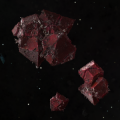Shattered planet
| This article is a stub, and not comprehensive. |
|---|
| You can help this wiki by expanding it. |
![]() Space Age expansion exclusive feature.
Space Age expansion exclusive feature.

Shattered Planet is a post-game location in space, far away from the planets in the Nauvis system, making this area the most dangerous to explore. Unique Promethium asteroids are located here, being the only remains of the now-shattered planet.
Exclusive items
The following items are unlocked en route to Shattered Planet:
Mechanics
As the player starts approaching the Shattered Planet, promethium asteroids are encountered. Moreover, the density of asteroids increases the further the platform is from the solar system. Promethium asteroids are stronger than the other three types, as they have doubled health. Second, they can not be crushed and processed like other asteroids. Promethium asteroid chunks are one of the components for crafting the promethium science pack.
The player is not expected to reach shattered planet as the density of asteroids reaches to the point it would overwhelm even a well-equipped ship.
Space routes
Shattered planet is only connected to Solar system edge![]() .
.
| Location | Distance (km) |
|---|---|
| Solar system edge |
4,000,000 |
Gallery
-
Three different sizes of a promethium asteroid.
See also
Trivia
- Any details of the Shattered Planet are completely unknown, including its name and how it was shattered. Based on the name of its asteroid remains, it is possible that the planet's name was "Prometheus", which is based on the name of one of the Titans in Greek Mythology, who was also a god of fire. Other planets in the game also have their names based on figures in Greek Mythology.
- Gleba's current name is not related to said Mythology, but during development, it was named Bacchus, after the Roman god of fertility, orchards, and vegetation.
